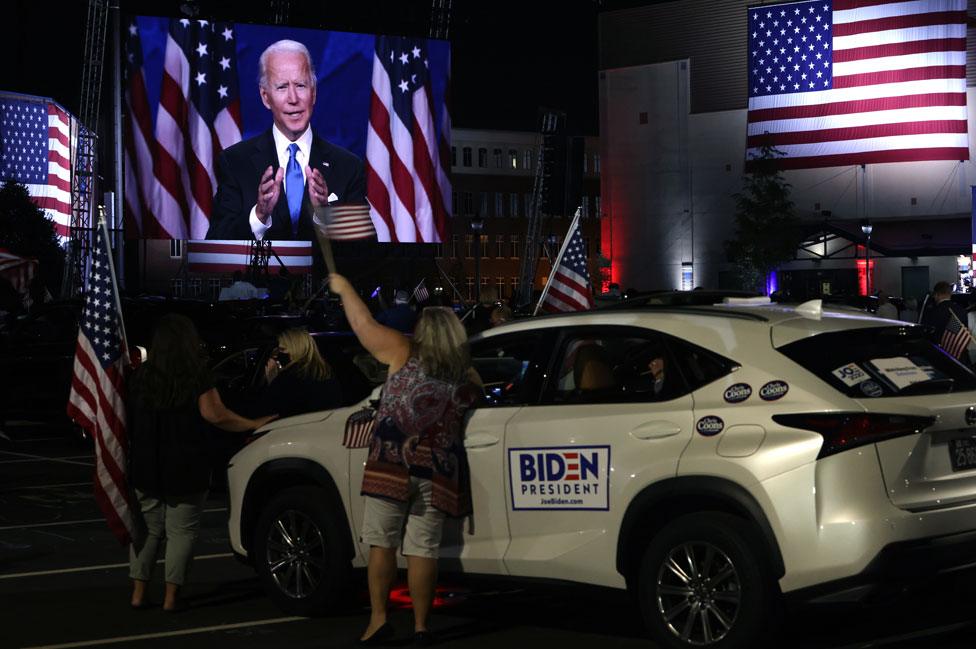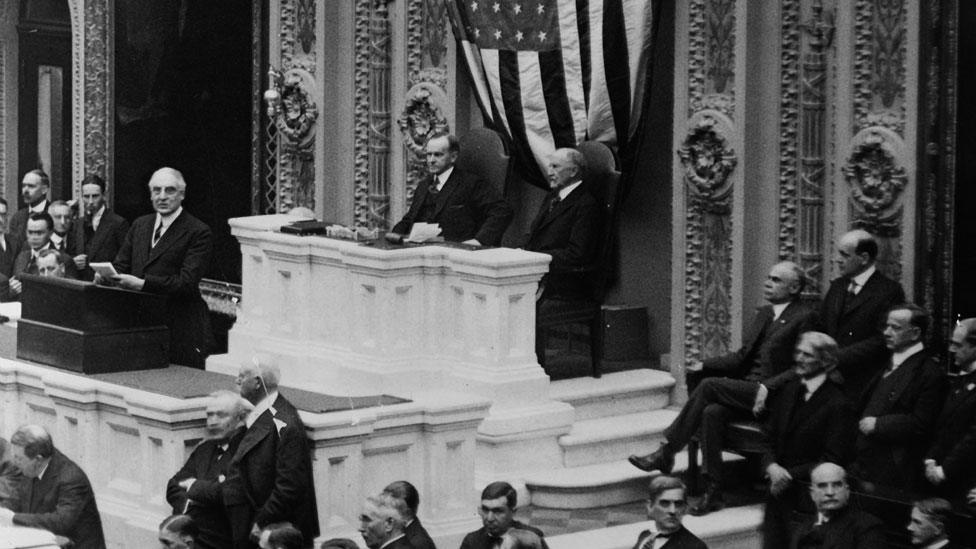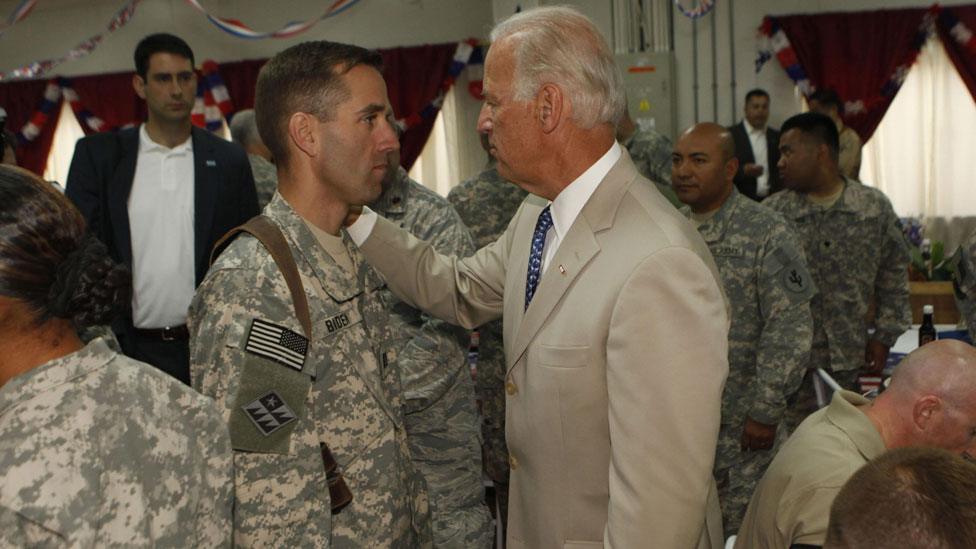DNC 2020: Did Joe Biden succeed in making his case?
- Published
Biden takes a swipe at Trump: 'Character and decency are on the ballot'
Call it Joe Biden's "return to normalcy" speech.
That was the Warren G Harding slogan when he ran for president in 1920, with a campaign centred on healing and calming Americans after the trauma of World War One.
In his winning presidential bid, he preached healing, serenity and restoration. To put it in modern terms, an end to all the drama.
Biden billed his campaign as a "battle for the soul of this nation", but his message on Thursday night - echoing Democratic speakers all week - was not so different from Harding's.
"It's time for people to come together," said Biden. "This is not a partisan moment, this must be an American moment."
He spoke of his campaign being an opportunity to heal, to reform, to unite, to "be a path of hope and light".
If he loses in November, it won't be because of anything that happened Thursday night or at the convention this entire week - which is exactly what a party currently leading in the polls wants.
So what were the three key things that stood out?
Hitting the mark
In big speeches like this, stagecraft - delivery - can be as important as the content. Stumble, and even the most eloquent words can be overshadowed.
Given that Trump and the Republicans seem to be building their campaign attacks around the assertion that 77-year-old Biden is suffering from age-related incapacity - "diminished" is the term they frequently used - there was particular pressure for Biden to hit his marks.
He did.
He flashed righteous anger when the text called for, such as when launching attacks on Donald Trump's handling of Covid-19 and the violence at the 2017 white supremacist rally in Charlottesville. He dialled it back when he sought to be reassuring, talking about those who have lost loved ones or are facing economic hardship.

It's not easy delivering an emotional speech from what was essentially a dark, empty ballroom, but the unusual circumstances of this "virtual" may have worked in Biden's favour, as well.
The circumscribed format kept his text taut and lean, avoiding the longtime politician's occasional penchant for senatorial bloviation. He gave the shortest Democratic acceptance speech since 1984.
Biden has made thousands of speeches in his nearly half-century in public life. On Thursday night, he gave a powerful address, delivered powerfully.
As if to confirm this, midway through Biden's appearance, Trump took to Twitter, external to attack the speech not for its content or delivery, but that it was "just words".


Building a Biden coalition
Ever since the end of the Obama presidency, there has been a clear and significant divide within the heart of the Democratic Party.
On one side of it are the progressives, best embodied by Senator Bernie Sanders, who advocate aggressive government programmes and policies they believe are necessary to address income inequality, racial injustice and environmental degradation. On the other side are the pragmatists, who preach more incremental change and bipartisan consensus. It's a camp Biden falls squarely into.
Given that Biden was the one giving the big speech Thursday night, it's clear how Democratic primary voters resolved that conflict.
Biden needs to find a way to hold the support of both the progressives and those in the middle if he hopes to win in November, however. His speech on Thursday seems to indicate he's fairly confident about holding his left flank. He may figure simply not being named Donald Trump may be enough for that. While he paid tribute to Franklin Roosevelt's New Deal, his speech was light on ambitious, big-government rhetoric.

A return to normalcy worked for Warren Harding in 1920, but will it this time?
Biden's aim was to reach out to the middle - and across to disaffected Republicans and independents. He noted that while he will be the Democratic candidate, he will "work as hard for those who didn't support me as I will for those who did".
Coalition-building is the key to winning elections.
Throughout the week, the Biden team sought to pitch a tent big enough for the Republican ex-governors like John Kasich and progressive stars like Elizabeth Warren and Sanders. Now he has to hope it holds up to the storm that Trump and his team are sure to bring in the coming weeks.
Character over policy
It's fairly clear at this point that the Democratic strategy for defeating Trump is to turn this race into a contrast of character. This week, speaker after speaker tried to hammer home that their guy, hardened by personal tragedies, had it, while the current president is lacking.
In what was perhaps the most powerful moment of Thursday evening, Brayden Harrington, a 13-year-old with a stutter, spoke of how he was befriended and counselled by Biden, who himself dealt with a childhood stutter. Democrats surely hope that Americans will see the contrast with Trump, who has in the past mocked people for their appearance or their abilities.
Brayden Harrington: 'Joe Biden made me more confident about my stutter'
For days, Democrats had been talking about Biden's empathy. Now, in his speech, Biden tried to show it.
"I know how it feels to lose someone you love," he said. "I know that deep black hole that opens up in your chest. That you feel your whole being is sucked into it. I know how mean and cruel and unfair life can be sometimes."

Joe Biden and his son Beau in 2009 in Iraq. Beau died six years later
What Biden mostly didn't show, or talk much about, were the specifics of what he wants to accomplish as president. He dwelled on things Trump has done that he will stop, but when it comes to his own policies and programmes, Biden painted in broad strokes.
The one place he did dive into details was in his Covid response plan - which, to be fair, is the topic most Americans probably care about most at this point.
If Biden wins the White House, however, what will the voters want - or expect - him to do?
Removing Trump from office may be enough for many. But for the heavy lifting of legislating - to tackle key Democratic issues like healthcare, the environment and education - it helps to have built tacit support, a mandate, for a course of action during the campaign.
At the moment, there really isn't much of a Biden campaign to speak of, as the pandemic has kept the candidate close to his home in Delaware.
That may be one more thing the Democratic nominee has in common with the "return to normalcy" campaign of Warren Harding. In 1920, that nominee spent most of his time at home in Marion, Ohio. It was a winning strategy 100 years ago. Perhaps it will be for Biden, as well.
